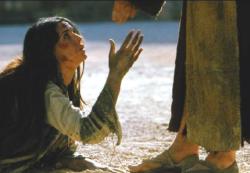
|
As we prepare for worship this Sunday, pray for all our worship leaders, pray for our visitors, pray for a spirit of friendliness, confidence, and joy for our assembly.
You may want to study the following Scriptures in advance: John 1:29, John 8:1-11; Romans 3-8; 1 John 3 |
 |
Song #902 "Nothing But the Blood"
Song #903 "There's Power in the Blood"
Song #904 "Have You Been to Jesus"
Song #176 "Lamb of God"
Communion
Offering
Song #202 "Joyful, Joyful We Adore Thee"
 In the opening scene of The Passion of the Christ , Satan is attempting to persuade Jesus to abandon his mission. Satans strategy is to cause Jesus to doubt. Two weeks ago we looked at Satans attempt to cause Jesus to doubt himself (Whose Son Are You? 3/21/2004). Satan also tries to make Jesus doubt the possibility of salvation. "Saving them is too costly," Satan muses. "Can one man really bear the sins of the whole world?"
In the opening scene of The Passion of the Christ , Satan is attempting to persuade Jesus to abandon his mission. Satans strategy is to cause Jesus to doubt. Two weeks ago we looked at Satans attempt to cause Jesus to doubt himself (Whose Son Are You? 3/21/2004). Satan also tries to make Jesus doubt the possibility of salvation. "Saving them is too costly," Satan muses. "Can one man really bear the sins of the whole world?"
Of course this scene is not presented in the gospels. It is the directors artistic license. But those do seem like the sort of questions Satan would ask. Jesus, as God in the flesh, knows sin from heavens perspective and from the human perspective. Certainly he, more than anyone, would know how costly it would be to bear the burden of sin. Christ witnessed first hand the evil, immorality, and corruption that infect us. Even before the crucifixion Jesus experienced the cruelty of sin.
One such experience is recorded in John 8:1-11.
Sin oozes out of every corner of this event: A woman probably married or perhaps a prostitute has been caught in the act. Families have been betrayed by this act. Not only the marital partners are shamed by this offense the community that honors marriage is also shamed. It is a horrible, scandalous event.
But theres also the sin of her accusers. Their motives are not pure. This is not some neighborhood watch or good citizens brigade. The very set-up of this little scandal hints at their guilt. As my mother used to say, "Wheres the man involved and how did the rest of them know about this?"
The crowd is no better than a frenzied Jerry Springer audience who demonstrate their own wickedness by getting carried away in judgment. And the engineers of this little trap are even more devious. This whole scenario, for them, is not about righteousness it is an attempt to discredit Jesus.
Lets take a closer look at their trap and more importantly Jesus response so we can understand how Jesus, through his ministry and sacrifice, does indeed bear the sin of the world. Heres how their trap works:
Well get to Jesus response in a moment, but to understand his response we need to understand some important points about sacrifice and how sacrifice is involved in bearing the sins of the world.
After all, if we think about Satans question "Can one man bear the sins of the whole world?" - Doesnt it seem a bit unfair and perhaps simplistic that Jesus can take the punishment for my crimes?
 If some decent soul came forward to accept the punishment for the crimes of Saddam Hussein, and if the courts actually allowed this decent person to take on this punishment would we call that grace? Would we really feel as if justice had been satisfied if another person suffered the punishment the Hussein deserved. Wouldnt we rather feel that something is wrong with the system and wouldnt we sympathize with those whom Hussein oppressed knowing that their oppressor gets away scot-free? I hope you feel theres something wrong with that situation. If Jesus is just sacrificing himself so we can avoid the due penalty for our crimes then yes, there would be something wrong with the whole thing.
If some decent soul came forward to accept the punishment for the crimes of Saddam Hussein, and if the courts actually allowed this decent person to take on this punishment would we call that grace? Would we really feel as if justice had been satisfied if another person suffered the punishment the Hussein deserved. Wouldnt we rather feel that something is wrong with the system and wouldnt we sympathize with those whom Hussein oppressed knowing that their oppressor gets away scot-free? I hope you feel theres something wrong with that situation. If Jesus is just sacrificing himself so we can avoid the due penalty for our crimes then yes, there would be something wrong with the whole thing.
But sacrifice involves much more than that because the problem is not simply "legal." And our sins are not simply "crimes." Our sin involves personal, moral offense. The problem is more than legal it is human. Our sin is rebellion and our "crime" is that of a child who insults decent parents. Our corruption hurts others and we have wounded one another sometimes because we have been wounded. Jesus sacrifice is not merely a "legal" transaction or a sentence declared by a judge.
The purpose of sacrifice (even in the history of Israel) was not about changing God so he can live with us. God is not the problem in the relationship. We need to be careful that we dont make pagan assumptions about sacrifice. In paganism, the sacrifice appeases or persuades the deity. Sacrifice is not giving God his pound of flesh so he can settle down. Its not the ritual that allows Holy God to tolerate sinful us.
The purpose of sacrifice (in Israels history and in Jesus) is about God revealing his mercy and gracious initiative and that changes us. Confronted by the grace that God offers and the confession of our weakness we are called to holiness. Sacrifice isnt holding off God so we wont die it is God arousing us to the problem so that we might live!
Consider that God chose Israel long before they sacrificed to him. Their frequent error was that they thought they could pursue life their way as long as they made the right sacrifices. And even we think that as long as we appeal to Jesus sacrifice the right way then we can pursue our own projects and our own desires. God himself said "I desire mercy, not sacrifice." (Hosea 6:6). Jesus, the one who sacrificed himself for us, indicated this same thing. He said it was something that we needed to learn.
We can say this about sacrifice:
The sacrifice of Jesus Christ is a kingdom of God approach to taking away the sins of the world. Considering these two observations about sacrifice, lets see how both of these are involved in Jesus response to the accusers in John 8
If any one of you is without sin ...

To the crowd (the accusers) Jesus reveals that the problem is not simply the sinful woman. It is sinful humanity. Her sinfulness is part of the human condition. Jesus is saying to the crowd Who among you is pure enough to throw the need for mercy out the window. If you want to start the blame game, then who among you will be blameless. Jesus gets the crowd to see their need for mercy by recognizing their sinfulness. As the people (oldest to youngest) turn and walk away, they are making a confession. They are admitting their sinfulness. Ironically, its our sinfulness that causes us to construct systems of punishment and judgment. We exclude others and we judge others. We look for people to blame. In the political world those who succeed by the scandal and blame game will die by it. For all are guilty of something. Jesus question to the crowd is not a bold stance for tolerance that rules out judgment. Hes not trying to save the woman, rather he is trying to save the crowd from its own cruelty and self-righteousness. Jesus sacrificial way of living and dying reminds us that each of us is damnable and we have need of mercy.

Go and Sin No More.
To the woman caught in sin Jesus offers mercy instead of condemnation. Why? Condemnation leads only to death. There is no hope, but it is easy. Mercy isnt easy. It means forgiving and forgiving usually costs but it does offer the hope of change. Some who want to excuse their behavior by repeating Jesus word that "He without sin should cast the first stone" should also hear this word: "Go and sin no more." When we cry out against the judgment of others (or even our self-judgment) we are trying to bear the burden of our own sin. We dont want to let go or admit our weakness and sin. So we throw the blame on others. We justify our action. For new life to begin we have to confront our own sinfulness, but even thats not enough, we have to confront the one who can take our sin away and replace it with his spirit.
Heres the good news: Jesus mercifully takes up all our sin he removes it and cleanses us so that we might be changed. And in being changed we have the possibility of living for him. "The one who was not sin became sin for us, so that we might become his righteousness." (2 Corinthians 5:21).
Like the woman caught in the act, you are not saved because you have a good lawyer, or because Jesus is soft and tender-hearted. Youre not saved because you know all the Scriptures and can find a loophole. Youre not saved because you have claim on God and know the proper rituals and prayers to appease his wrath.
You are saved because of the Lamb of God who takes away the sins of the world. (John 1:29).
Invitation for responses/prayers
Prayer and Sending Out
Song #315 "It Is Well With My Soul"
 Link to next sermon
Link to next sermon
 Link to other sermons of Chris Benjamin
Link to other sermons of Chris Benjamin